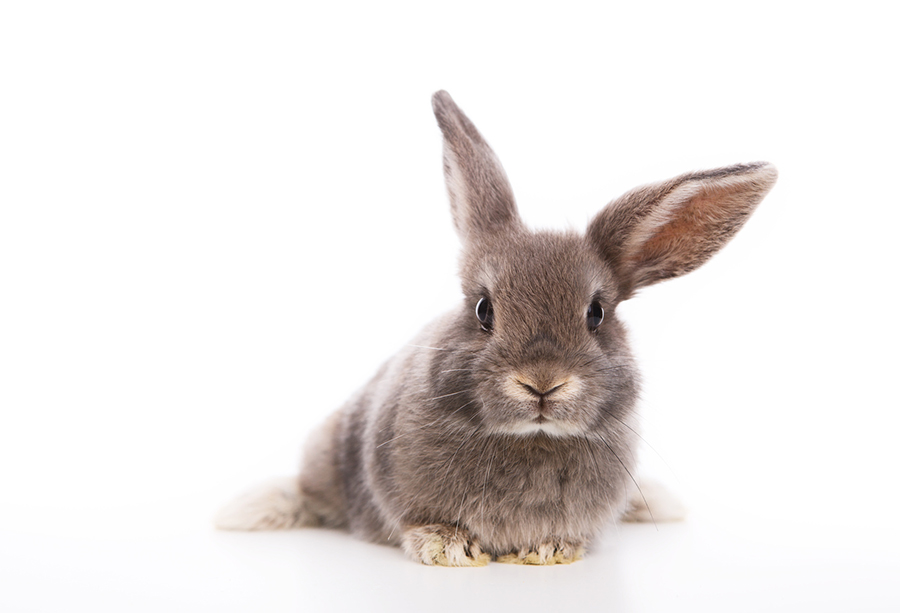Rabbit Health and Care
Basic information
Average life span: 8-12 years (ave 6-8)Body temperature: 37-39.4CAge of puberty: 16-24 weeksWeaning age: 7-8 weeksLength of pregnancy: 30-33 days
Housing
Rabbits are sociable although bucks (males) often fight and so are best not kept together. Does (females) will live happily together though provided they are introduced at a young age. A single buck (male) will live with a doe (female) or group of does but obviously breeding will occur and the buck will need to be removed prior to the birth of any litter to prevent cannibalism of the babies.
Hutches made of wood or plastic are the most common form of keeping your rabbit warm and dry. They should be weatherproof and at the same time, well ventilated. The hutch will also need to be fly-screened to prevent mosquitoes that can transmit the fatal Myxomatosis virus and Rabbit Calicivirus. It is preferable for the hutch to be elevated off the ground.
The hutch should be of such dimensions to enable the rabbit to move around freely, ideally the bigger the better. Aim for a cage at least four times the size of the rabbit (at maturity). Ideally the hutch should also have a separate bedding compartment where your rabbit can go to hide. Both compartments of the hutch should have hinged or lift off doors to facilitate the removal of your pet and for cleaning purposes.
The floor of the hutch should be covered with an absorbent material such as newspaper, wood shaving, straw or hay. Rabbits will usually only toilet in one place and can be trained to use a litter tray. Cleaning out should be done on a regular basis, once a week should be sufficient, but more frequently in warm weather. It is also important to protect rabbits from overheating in warm weather. Bring them under shade and/or place iceblocks in drinking water.Feeding
Each rabbit will have different tastes and not all rabbits like the same things to eat. However, it is important to know what can and cannot be fed to rabbits to avoid harming the rabbit and to help keep the rabbit healthy. The mainstay of a rabbit’s diet should include good quality hay, such as oaten hay, supplemented with vegetables and rabbit pellets. Anything beyond this should be considered a treat and should be fed in strict moderation. A constant supply of hay is essential (NOT straw) as the fibre contained is vital to their digestion and should form the bulk of their diet. Any hay must be dry, clean and free from dust and mould. Grass hay such as Oaten or Meadow hay is best - Lucerne hay although beneficial for young and nursing or pregnant rabbits is too rich in calcium and protein and should be not be used continually but can be given as an occasional treat to adult rabbits.
Although hay and rabbit mix will provide the rabbit with a good basic diet it is necessary also to feed fruit, vegetables or plants. If too much fruit or vegetables is fed and left in the cage this should be removed and replaced the next day to avoid it being left and becoming mouldy. Rabbits will eat their faeces to obtain maximum nutrition from their food.
Some Fruit, vegetables and herbs that are safe to feed a rabbit are listed below:
| Fruit | Vegetables |
| Apple (seedless) | Asparagus |
| Basil | |
| Broccoli and stalks | |
| Grapes | Brussel sprouts |
| Melon | Carrots and Carrot Tops in small amounts |
| Orange (peeled) | Cabbage (small amounts only) |
| Pears | Cauliflower leaves and stalks |
| Strawberry leaves | Celery leaves |
| Tomato | Asian Greens |
| Green Pepper | |
| Parsley - a good tonic | |
| Spinach | |
| Turnip |
Vegetables and herbs that should not be fed are:
- Apple seeds
- Potato and Potato Tops
- Rhubarb and Rhubarb Leaves
- Tomato Leaves
- Watery fruits/veg such as cucumber and lettuce.
Vaccination
Rabbits need to be vaccinated yearly against Calicivirus (Haemorrhagic viral disease). The disease is almost always fatal and death occurs rapidly, within 12 – 18 hours, from respiratory and heart failure. There is no known treatment. We recommend vaccinating young rabbits at 6-10 weeks of age followed with a booster 4 weeks later, and then continued immunity is maintained with annual booster vaccinations. Adult rabbits (over 10 weeks) receive one initial vaccination, followed by annual booster vaccinations
Sterilisation
Did you know that 80% of female rabbits have cancer of the uterus by the age of 5-6 years?! Sterilisation of your rabbit is essential to help prevent nasty diseases like this in addition to providing many of the behavioural benefits that we see with our pet dogs and cats. It also means you can allow your male and female bunnies to play together without increasing the size of your furry family! Please enquire at reception for more information.




